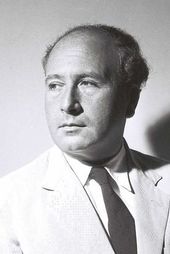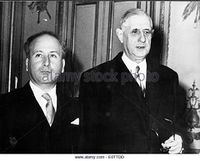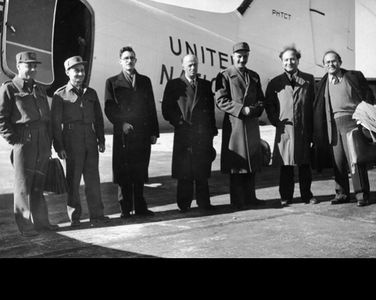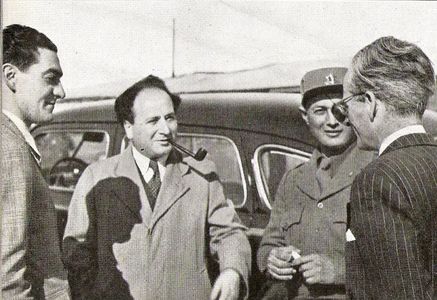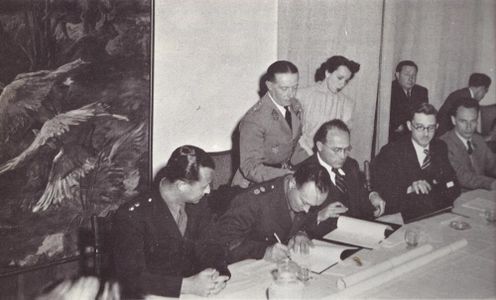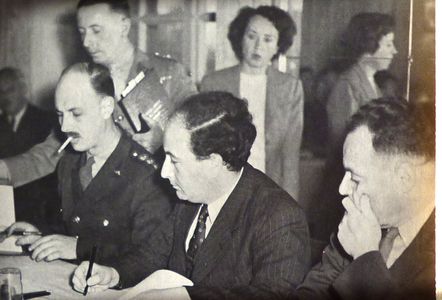والتر إيتان
والتر إيتان (بالعبرية: ולטר איתן؛ إنگليزية: Walter Eytan؛ عاش 24 يوليو 1910 - 23 مايو 2001) كان دبلوماسي إسرائيلي. وكان المدير العام لـلوزارة الخارجية الإسرائيلية في 1948-1959 وسفير إسرائيل إلى فرنسا في 1959-1970.[1]
سيرته
والتر إتنگهاوزن (لاحقاً: إيتان) وُلِد في ميونخ، ألمانيا. أثناء الحرب العالمية الأولى، انتقلت عائلته إلى سويسرا ثم استقرت في إنگلترة، حيث التحق بمدرسة سانت پول.[2] وقد أصبح معيداً في جامعة أكسفورد.[3] جـُنـِّد للعمل في المخابرات البريطانية من منصبه كمحاضر في اللغة الألمانية القروسطية، حيث مر بتدريب عسكري أساسي كمدفعجي دبابة وأُلحِق بالقسم البحري في بلتشلي پارك، حيث أشرف على ترجمة الرسائل الألمانية، ضمن الفريق الذي كسر شفرة ماكينة إنيگما الألمانية.[4]
وزارة الخارجية
انتقل إيتان إلى القدس في 1946، ليصبح المتحدث بإسم القسم السياسي للوكالة اليهودية.
وفي 9 يناير 1948 قدّم أول مسودة "خطة عامة لمكتب خارجي وخدمة خارجية للدولة اليهودية".
كان إيتان رئيس الوفد الإسرائيلي في مفاوضات الهدنة في رودس 1949. الوفد ضم إيگال يادين، رئوڤن شيلوا، إلياهو ساسون، شبطاي روزن.[5] وقد اعتبر الوفد الأردني "مزري ... لا حول له وضائع"؛ وقد وصف الوفد السوري بأنه "مجادل بشراسة."[6]
وفي 16 مارس 1949، كان مع موشيه ديان وإيگال يادين في لقاء استمر طوال الليل مع الملك عبد الله، في قصره بالشونة بالقرب من البحر الميت.[7] وقد حضر لقاءً آخر مع الملك في عمان في أكتوبر 1950. عقد الملك اللقاء، ضد رغبة وزرائه.[8]
في الشهر التالي، قاد إيتان وفداً إسرائيلياً إلى مؤتمر سلام الأمم المتحدة في لوزان. One of the major issues discussed was what was to happen to Palestinian refugees who had left their homes during the fighting. In a statement, 5 May 1949, Eytan said: "It would be doing the refugees a disservice to let them (the refugees) persist in the belief that if they returned, they would find their houses or shops or fields intact ... any Arab house that survived the impact of war ... now shelters a Jewish family. There can be no return to the status quo ante."[9] His delegation's final compromise offer was that Israel would take control of the Gaza Strip with its residents including refugees and would accept the return of 100,000 refugees. At the time Eytan estimated that there were a total of 800,000 refugees.[10] وحول قضايا الأراضي، كان الوفد مستعداً لمقايضة حول إيلات التي لم يكن إيتان مقتنعاً بأي أهمية استراتيجية لها.[11] By August 1949 it was understood by all the participants that the conference had failed.
During Isser Be'eri's trial for the wrongful execution of Meir Tobianski he supported a member of the Foreign Ministry research department who leaked a secret document to the defence lawyers that implied Tobianski had passed information to the British.[12]
In December 1949 he asked the Israeli Army to stop mass deportations of Palestinians since large groups resulted in complaints being raised with the Mixed Armistice Commission. In particular the Foreign Ministry blocked an IDF plan to create a 5–10 km Arab-free zone along the Lebanon border.[13] He suggested that they "expel them in small groups or individually."[14] Despite this, on 31 May 1950, 120 prisoners from an IDF detention camp near Rehovot were forced into the وادي عربة، جنوب البحر الميت. Due to the subsequent international criticism Eytan had to assure the US ambassador that those responsible would be punished.[15]
In 1951 he was a member of a four-man committee, including Yigal Yadin, Reuven Shiloah and Moshe Sharett, set up to consider special operations outside the borders of Israel. Up till then these had come under the responsibility of the Foreign Ministry's Political department. On 1 September 1951 a new department was created reporting directly to the Prime Minister - the Central Institute for Intelligence and Special Missions, known as Mossad. The long term decline of the Foreign Ministry's Research department and its inability to make its own intelligence assessments was one of the major findings of the 1974 Commission of inquiry into failings leading up to the 1973 war.[16]
وفي فبراير 1953، انتقد إيتان فاعلية الغارات الانتقامية للجيش الإسرائيلي.[17]
وبحلول 1958، كانت مصلحة الخارجية تتكون من 682 مسئولاً، 427 منهم كانوا محليين في دولهم؛ وكان هناك 12 سفير، 15 وزير مفوض، 1 ممثل دبلوماسي، 3 قائمين بالأعمال و 37 قنصل وقنصل عام. In addition the Foreign Ministry in Jerusalem had 338 staff. Its 1957-1958 budget was 10,650,000 Shekels, just over £2,000,000.[18]
وفي سبتمبر 1965 رتب لقاءً سرياً في باريس بين وزير الخارجية گولدا مئير والملك حسين من الأردن. وكان ذلك أول لقاء عالي المستوى للملك مع مسئول إسرائيلي.[19]
في 24 مايو 1967 رتب إيتان لقاءاً عاجلاً في باريس بين وزير الخارجية أبا إيبان والرئيس الجنرال شارل ديگول لشرح وجهة نظر إسرائيل في الأزمة المتصاعدة مع مصر. افتتح ديگول اللقاء بالنصيحة: "Ne faites pas la guerre." اللقاء انتهى بإصراره على أن إسرائيل يجب ألا تكون البادئ بإطلاق النار في أي نزاع. وفي 4 يونيو فرض الفرنسيون حظراً على كل شحنات السلاح إلى إسرائيل.[20][21]
صور
- الوفد الإسرائيلي
الفريق الإسرائيلي المفاوض. من اليمين إلى يسار: رئوڤن شيلوا، والتر إيتان، إيگال يادين، إلياهو ساسون، شبطاي روزن. يقفون لالتقاط صورة أمام الطائرة التي ستقلهم إلى رودس لمباحثات الهدنة في 1949.
د. والتر إيتان وموشيه ديان وباقي الوفد الإسرائيلي في اتفاقيات الهدنة في رودس، 1949.
موشيه ديان يوقع اتفاقية الهدنة الإسرائيلية المصرية، 24 فبراير 1949.
والتر إيتان (في المنتصف) يوقع اتفاقية الهدنة الإسرائيلية المصرية، 24 فبراير 1949.
الهامش
- ^ Morris, Benny (1987) The birth of the Palestinian refugee problem, 1947-1949. ISBN 0-521-33028-9. p.300
- ^ Walter Eytan obituary, The Daily Telegraph
- ^ McDonald, James G. (1951) My mission in Israel. 1948-1951. Victor Gollancz Ltd. Page 237.
- ^ Walter Eytan obituary, The Daily Telegraph
- ^ Eban, page 137.
- ^ Bailey, Sydney D. (1982) Four Arab-Israeli wars and the peace process. ISBN 0-333-48226-3 (1990 edition). Pages 61, 63.
- ^ Dayan, Moshe (1976) Moshe Dayan: story of my life. ISBN 0-688-03076-9. Page 141.
- ^ Pappe, Ilan (1992) The making of the Arab Israeli conflict. 1947-1951. ISBN 1-85043-819-6 (1994 edition). Page 265.
- ^ Morris, Birth, page 255.
- ^ Morris, Birth, pages 283, 297.
- ^ Morris, Birth, page 274.
- ^ Steven, Stewart (1980) The Spymasters of Israel ISBN 0-345-33927-4. Page 28.
- ^ Morris, Benny (1987) The birth of the Palestinian refugee problem, 1947-1949. Cambridge University Press. ISBN 0-521-33028-9. p. 242
- ^ Morris, Benny (1993) Israel's border wars, 1949-1956: Arab infiltration, Israeli retaliation, and the countdown to the Suez War. ISBN o 19 827850 0. Page 150.
- ^ Morris, Border Wars, pages 150, 157.
- ^ Steven, pages 36, 38.
- ^ Morris Border Wars, page 219.
- ^ Eytan, page 196.
- ^ Shlaim, Avi (2007) Lion of Jordan. The life of King Hussein in war and peace. ISBN 978-0-14-101728-0 (2008 edition). Page 221.
- ^ Bailey, pages 202, 206.
- ^ Eban, Abba (1977) Abba Eban. An autobiography ISBN 0-7088-1467-0 (1979 edition). Pages 341-4.
- Articles containing عبرية-language text
- Articles containing إنگليزية-language text
- Pages using Lang-xx templates
- مواليد 1910
- أشخاص من ميونخ
- خريجو جامعة أكسفورد
- أكاديميو جامعة أكسفورد
- بلتشلي پارك
- سفراء إسرائيل إلى فرنسا
- مهاجرون ألمان إلى إسرائيل
- دبلوماسيون إسرائيليون
- يهود إسرائيليون
- يهود في فلسطين الانتداب
- صهاينة
- وفيات 2001
